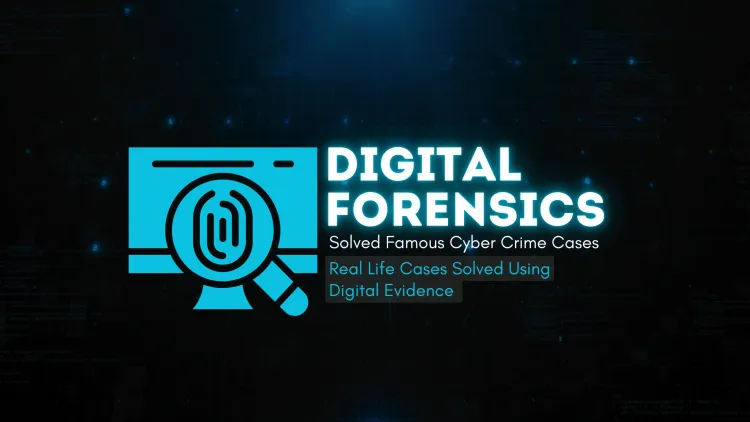How Digital Forensics Solved Famous Cybercrime Cases? Real-Life Cases Solved Using Digital Evidence
Digital forensics is a critical tool in solving cybercrimes and traditional crimes by analyzing digital evidence like emails, server logs, and GPS data. High-profile cases, such as the 'Waifu' hacker and Ireland’s ransomware attack, highlight how forensic experts track cybercriminals using IP addresses, malware analysis, and digital trails. This field has not only solved cold cases like the Kimberly Bell murder but also thwarted hackers like David Young in Ireland. By leveraging advanced tools and techniques, digital forensics ensures justice and strengthens cybersecurity for the future.

Digital forensics is a powerful tool used to uncover and analyze digital evidence, helping solve crimes ranging from hacking incidents to cold cases. It acts as a digital detective, revealing the actions and identities of criminals. Let’s explore real-life examples where digital forensics played a pivotal role and the methods investigators used.
1. The Arrest of Hacker ‘Waifu’
What Happened?
A hacker known as ‘Waifu’ infiltrated the systems of 165 companies, stealing sensitive data and demanding money in exchange for keeping the data private.
How Did They Investigate?
- Analyzed the hacker’s techniques, such as data transfer methods.
- Tracked IP addresses used during the attacks.
- Forensic experts investigated activity on the dark web and linked it to the hacker.
- Evidence pointed to Connor Moucka, leading to his arrest.
Why It’s Important:
This case demonstrates how digital forensics can uncover even the most hidden criminal activities.
2. Solving a 2019 Murder with Digital Evidence
What Happened?
In 2019, Kimberly Bell was murdered, and there weren’t enough leads to identify the perpetrators initially.
How Did They Investigate?
- Revisited emails, text messages, and call logs for clues.
- Used GPS location data to map suspects’ movements.
- Examined metadata from social media images to reconstruct timelines.
Why It’s Important:
Digital forensics revived this cold case and helped law enforcement solve a previously unsolvable crime.
3. The Park Magic Hacking Case in Ireland
What Happened?
David Young hacked into a parking system called Park Magic in Ireland, threatening to leak customers’ private data.
How Did They Investigate?
- Reviewed server logs to trace unauthorized system access.
- Tracked the hacker’s IP address and analyzed hacking tools.
- Seized and examined Young’s computer, finding evidence of the breach.
Why It’s Important:
This case highlights how digital forensics can swiftly identify and stop cybercriminals.
4. Ireland’s Health Service Ransomware Attack
What Happened?
In 2021, Ireland’s Health Service Executive (HSE) faced a ransomware attack, disrupting operations as hackers demanded payment to unlock the system.
How Did They Investigate?
- Created a timeline of the ransomware attack by analyzing system logs.
- Studied the malware to understand its functionality and spread.
- Tracked communication channels used by hackers for ransom demands.
- Collaborated with international agencies to trace the malware’s origins.
Why It’s Important:
This case emphasizes the importance of digital forensics in combating large-scale cyberattacks and safeguarding critical infrastructure.
Step-by-Step Explanation of How Digital Forensics Works
1. Identify the Problem:
Detect suspicious or criminal activities in systems, networks, or devices.
2. Collect Evidence:
Gather essential data, such as:
| Type of Evidence | Examples |
|---|---|
| Server Logs | Login attempts, system errors |
| Emails | Communication trails |
| GPS Data | Location tracking |
3. Analyze Data:
- Examine patterns in logs and messages.
- Investigate how attackers gained access.
4. Trace the Criminal:
- Track IP addresses, online accounts, or devices used.
- Cross-reference data to identify the attacker’s identity.
5. Prepare Reports:
Create clear and concise reports for use in legal proceedings or organizational reviews.
Why Digital Forensics Matters
- Protects organizations from cybercrime.
- Helps law enforcement solve cases faster.
- Strengthens legal cases with concrete digital evidence.
Conclusion
Digital forensics is a critical tool for solving modern crimes, whether it’s hacking, ransomware attacks, or cold case investigations. By analyzing digital evidence, investigators can uncover vital clues, catch criminals, and prevent future incidents. This field demonstrates how technology and expertise can work together to solve even the most complex cases.
Explore the power of digital forensics today—it’s more than a tool; it’s the future of crime-solving!
FAQs
-
What is digital forensics?
Digital forensics is the process of analyzing digital evidence to solve crimes and uncover cybercriminal activities. -
What was the 'Waifu' hacker case?
A hacker named 'Waifu' infiltrated 165 companies, stealing sensitive data and demanding ransom. -
How was the 'Waifu' hacker caught?
Investigators used IP tracking, dark web activity analysis, and forensic tools to identify the hacker. -
What role does digital forensics play in solving murder cases?
It helps analyze emails, GPS data, and social media metadata to find suspects and establish timelines. -
What was the Park Magic hacking case?
A hacker breached a parking system in Ireland and threatened to leak customer data. -
How do forensic experts investigate ransomware attacks?
They analyze system logs, examine malware behavior, and trace communication channels used by attackers. -
What tools are used in digital forensics?
Tools like EnCase, FTK, and Autopsy are used to analyze digital evidence. -
Why is digital forensics important?
It helps uncover digital footprints, solve cybercrimes, and secure justice in legal cases. -
Can digital forensics help prevent cyberattacks?
Yes, by identifying vulnerabilities and strengthening defenses. -
What skills do digital forensic experts need?
Skills in data recovery, malware analysis, and legal knowledge are crucial.











![Top 10 Ethical Hackers in the World [2025]](https://www.webasha.com/blog/uploads/images/202408/image_100x75_66c2f983c207b.webp)



![[2025] Top 100+ VAPT Interview Questions and Answers](https://www.webasha.com/blog/uploads/images/image_100x75_6512b1e4b64f7.jpg)







